Gus Hill didn't find much support when he arrived at Laurier as a young Indigenous student almost two decades ago.
"There was little focus on Indigenous initiatives during my early days at Laurier," Hill recalls. "In many ways that lack of support made it a difficult place to be, but that has certainly changed over the years."
Today an associate professor in the Faculty of Social Work's Indigenous Field of Study program, Hill has served as part of a group of Laurier faculty and staff members who have worked to build academic programs, support services and a sense of community that together create an environment where Indigenous students can thrive.
"These efforts started from humble beginnings, but we've made great progress and that is credit to a small group of people who have put in a lot of hard work," Hill says. "Looking back, it's amazing what we've been able to accomplish."
Led by the Office of Indigenous Initiatives, Laurier has been working toward the goal “indigenization,” a term that reflects the incorporation of Indigenous knowledge into the daily life of the university. The goal of indigenization is embedded in Laurier's Strategic Academic Plan.
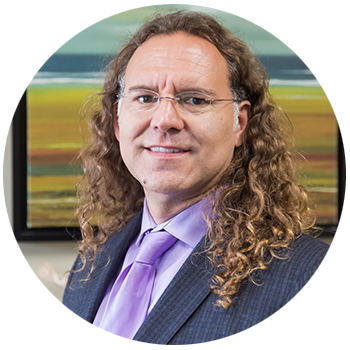
– Gus Hill

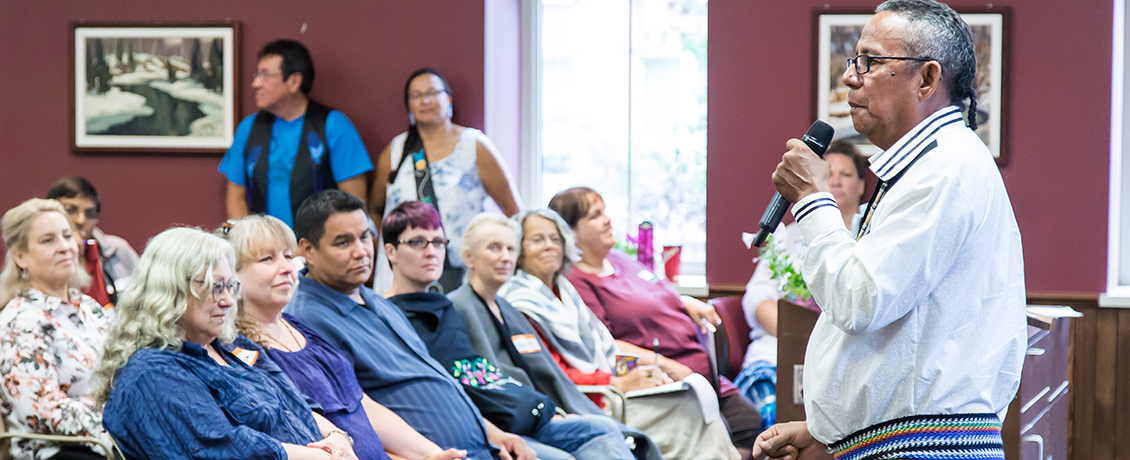
Six Nations elder Peter Isaacs speaks at Laurier's Faculty of Social Work in Kitchener.
Many of Laurier's Indigenous initiatives were born out of the Indigenous Field of Study program, which launched in 2006.
The first Master of Social Work program in Canada rooted in an Indigenous world view and contemporary social work practice, Laurier's Indigenous Field of Study program aims to develop social work practitioners who understand and respect the history, traditions and culture of Indigenous peoples. The program – which was created following consultation with Indigenous communities – includes teachings by elders, a traditional circle process and Indigenous ceremonies.
"The Master of Social Work Indigenous Field of Study program has been recognized as a gold standard program, a pillar of indigeneity and one of the best models of Indigenous education in the world," says Hill, who was part of the planning committee that initiated the program. "We position the student at the centre as a learner, but also attend to holism and the spirit."
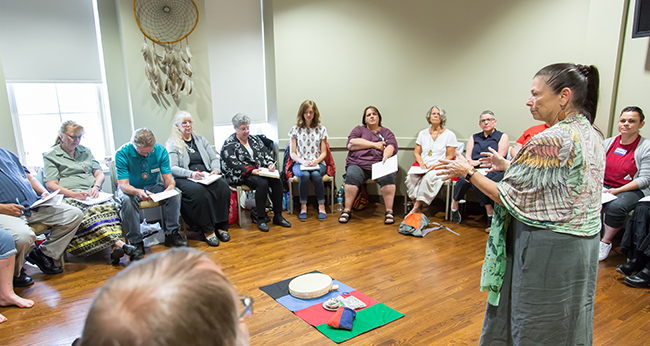
In 2018, an indigenized pilot PhD program designed for First Nations, Métis and Inuit peoples was launched out of Social Work's Indigenous Field of Study. Other recent initiatives launched from the program include Laurier's Centre for Indigegogy, which opened in June 2017 and offers Indigenous-centred professional development, education and training to members of the university community. In June, the centre hosted a two-day conference called After Canada 150: Restoring Indigenous Knowledge and Building Community Connections, which connected educators, students and the wider community with 20 Indigenous knowledge keepers from across the country.
"Laurier's support of the Centre for Indigegogy represents a positive change," says associate professor Kathy Absolon-King, director of the Centre for Indigegogy. "Historically, education played a role in colonizing Indigenous peoples and miseducating Canadians. Today, Laurier is supporting the Centre for Indigegogy to offer experiential and holistic professional training and development steeped in Indigenous knowledge, perspectives and culture."
Laurier's Indigenous-focused academic programming also includes an Indigenous Studies program at the university's Brantford campus. Through courses such as Indigenous People and Media, Gender and Indigenous Communities and Traditional Ecological Knowledge, students are immersed in a growing field of social, political, historical and cultural study. Delivering many of those courses are Laurier's eight Indigenous faculty members.

As well as academic programming, Laurier has worked to build social supports that help Indigenous students succeed at university. Indigenous student centres in Waterloo and Brantford are a home away from home, offering supportive cultural and academic programming. The centres are the site of activities including weekly soup lunches where Indigenous and non-Indigenous students, staff and faculty gather for a meal and to socialize. Outside of the centres, Indigenous community gardens serve as outdoor ceremonial and educational spaces.
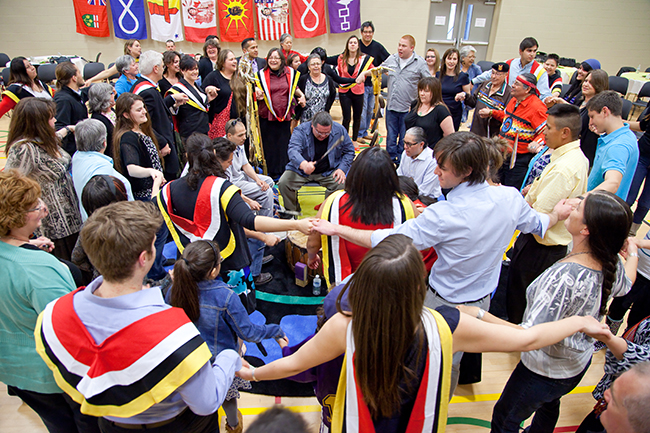
Another significant source of support to Indigenous students is Laurier's elder-in-residence program. The university's Brantford campus and Indigenous Field of Study program each have an Indigenous elder as part of their permanent staff. In Waterloo, visiting elders are available to students on a monthly or as-needed basis. Hill takes pride in the fact that Laurier's Indigenous Field of Study program was one of the first Canadian university programs to employ a full-time elder-in-residence.
"We wanted someone to support students in their cultural and spiritual needs and to be able to facilitate ceremonies with them," Hill says. "Hiring an elder-in-residence for the Indigenous Field of Study program was in direct response to Indigenous communities saying that young people didn't know how to work with or engage with elders and that was something needed in communities."
In addition to social supports, Laurier has launched academic assistance programs designed specifically for Indigenous students. The Indigenous Academic Success Program offers access to peer tutoring; Laurier's Support Aboriginal Graduate Enhancement, or SAGE, offers peer mentoring designed to support Indigenous graduate students; and the SEEDs program offers scholarships to students who participate in academic, social and cultural activities. Outside of academics, Laurier's Indigenous Students’ Association provides Indigenous and non-Indigenous students an environment to socialize and learn about Indigenous cultures.
Canada's Truth and Reconciliation Commission, which documented the history and impacts of the residential schools system, brought the importance of Laurier's efforts into greater focus. The commission's 2015 report contained 94 calls to action, among them recommendations outlining the role post-secondary institutions can play in the process of reconciliation.
The recommendations included calls to integrate Indigenous knowledge and teaching methods into classrooms, to address barriers Indigenous students face in accessing education and to provide opportunities for Indigenous students seeking to enter post-secondary education.
"Indigenous learners are the single-most under-represented group in Canadian higher education," says Laurier President and Vice-Chancellor Deborah MacLatchy. "As a university, we have both an obligation and an opportunity to acknowledge and support the unique needs of Indigenous communities and to create a climate where learning about and understanding indigeneity is part of the Laurier experience."
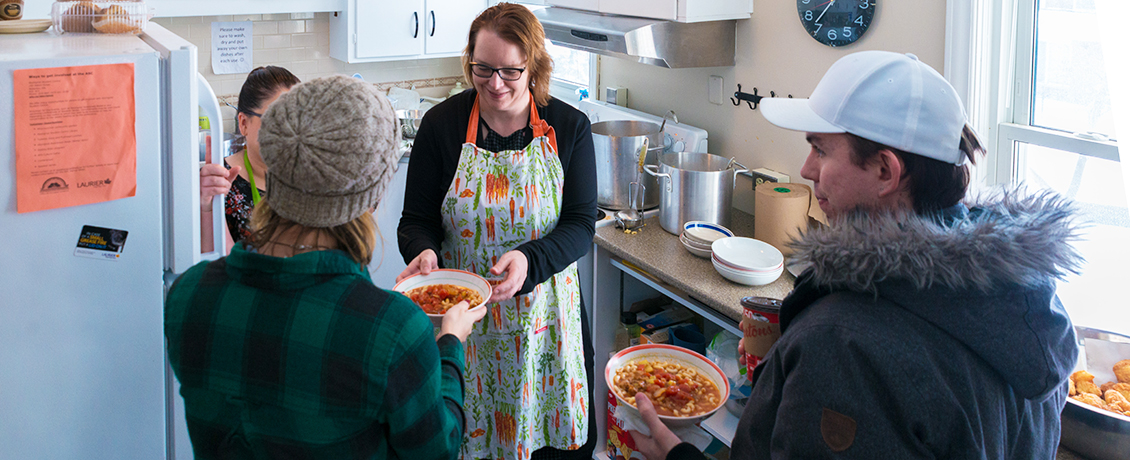
Laurier President Deborah MacLatchy serves a soup lunch at Laurier's Waterloo campus Indigenous Student Centre.

Helping the university meet the Truth and Reconciliation Commission's calls to action is Laurier's Indigenous curriculum specialist, Erin Hodson, who supports Laurier faculty members integrating Indigenous knowledge and Indigenous curriculum into courses and programs.
"This is a growing field in academia, with a growing number of post-secondary institutions creating space for this type of work," Hodson says. "Laurier’s investment in the mandate of this position reflects its strong commitment to Indigenous education."
Also providing guidance and direction to the university in the development of Indigenous curriculum and services is Laurier's Indigenous Education Council. Founded in 2010, the council is comprised of university administrators, faculty, students and Indigenous community members.
Many of the Indigenous initiatives that have blossomed at Laurier began during Max Blouw's time as university president from 2007 to 2017. Upon arriving at Laurier from the University of Northern British Columbia, Blouw made it a priority to increase programs and services for Indigenous students.
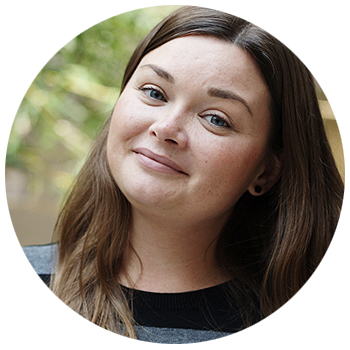
- Erin Hodson, Indigenous curriculum specialist
"I was aiming to encourage the institution to find a vision, to find direction, and Indigenous initiatives was a very big part of that," Blouw says. "One of the things I am really delighted by is that Laurier embraced without questioning what I think is a very important set of initiatives regarding Indigenous education."
One recent initiative Becker takes pride in is a new exchange program between Laurier and Syracuse University in New York State called Indigenous Mobility and Curriculum Across Borders, which is set to launch in 2019. The program will see three Indigenous students from Laurier and three from Syracuse University travel to each other's institutions before coming together to create content for an Indigenous curriculum guide, providing current students the chance to shape what future students learn about Indigenous peoples.
The program represents another step along Laurier's path toward the goal of indigenization.
"Our efforts have made us a national leader in building community and supports for Indigenous peoples in post-secondary education, but there’s a lot of work to be done," Becker says. "There's a huge gap in the quality of life between Indigenous people and non-Indigenous people in Canada. This, for me, is what we are really addressing."
Top photo: Laurier's growing focus on Indigenous initiatives included hosting an evening with Senator Murray Sinclair, chair of Canada's Truth and Reconciliation Commission, at the university's Brantford campus in September 2016. Moderated by CBC journalist Duncan McCue, the event featured Sinclair answering questions about Indigenous values, finding balance and leadership. Pictured at the top of the page are McCue, Jean Becker, senior advisor in Laurier's Office of Indigenous Initiatives, and Sinclair.